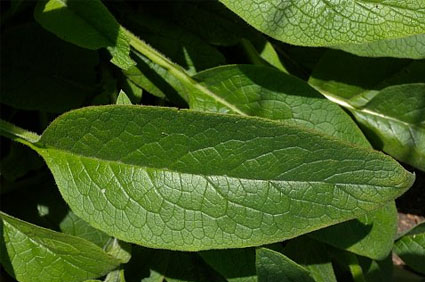Comfrey Leaf Benefits For Skin
Comfrey Benefits
Since 400 BC, early Greek physicians have used Comfrey to heal wounds and heal damaged
skin. The high Allantoin content promotes skin cell regeneration, stimulates the growth of
new cells and helps sensitive skin to become more resilient, counteracting dryness and
cracking. The Good Stuff Botanicals infuses apple cider vinegar with Comfrey Leaf in it's
Earth Tone herbal skin toner & astringent. Comfrey acts as an emollient and is very soothing,
inhibiting further damage to tissues, stimulating the production of cartilage, tendons and
muscles. It has been esteemed as a blood, bone and flesh builder.
The name comfrey is believed to come from Latin ‘confera’, meaning knitting together. The
genus name symphytum means to heal together, and for this use, it is renown: that it can
assist the body to heal any part that is torn or broken, which also explains the reason for
another common name, knitbone.
Scientific research shows that chlorophyll helps to rejuvenate old cells and promote the
growth of new cells. This action, together with comfrey’s allantoin properties (a cell proliferant)
provides us with a very powerful herb. Allantoin is one of the elements that makes comfrey
unique. Allantoin is also produced in the allantois gland of the umbilical cord (the link between mother and developing baby, which feeds the embryo) for promoting rapid cell growth. Allantoin is a leucocytosis promoter (increases white blood cells) that helps to establish immunity from many infectious conditions. This allantoin compound hastens skin regeneration and stimulates cell proliferation.
Comfrey leaf is also known for healing bruises and scrapes quite effectively. Studies in Europe show it’s effective in treating eczema, psoriasis, dermatitis, and viral skin infections. So, it can be effective in replacing the damaged cells of the body. Besides allantoin, another important compound found in it is mucilage. Both allantoin and mucilage have anti-inflammatory properties. So, they are used in alleviating the pain and inflammation associated with broken bones, sprains, arthritis, wounds, etc. Mucilage is also effective in intestinal disorders, while allantoin augments the immune system to fight against infectious diseases.

